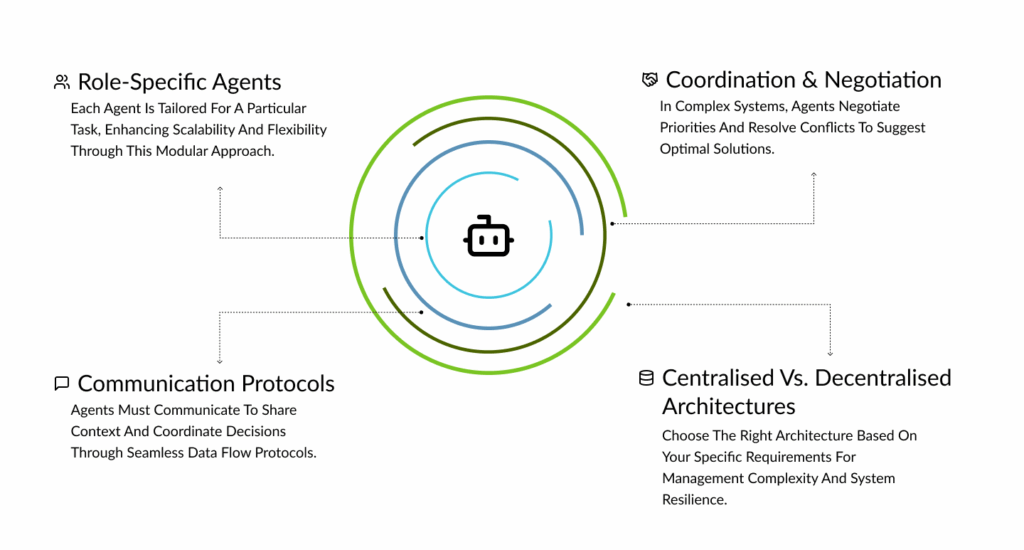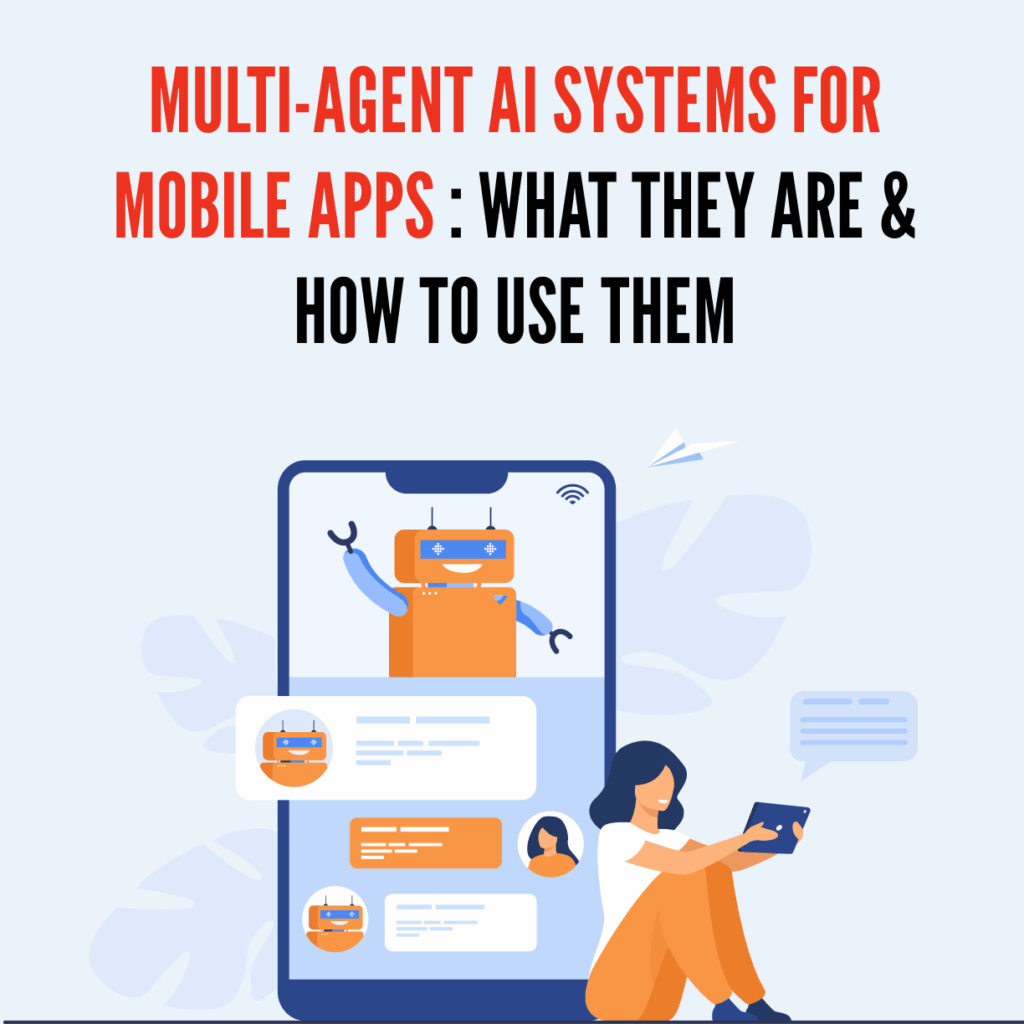|
Getting your Trinity Audio player ready...
|
AI has reframed the mobile app ecosystem for over a decade. From intelligent chatbots and predictive text formats to voice assistants, content recommendation systems, and others, AI has stealthily embedded itself into the core functional state of today’s most popular applications. Whether an application is an AI indefinitely working with Siri to control reminders or Google Maps suggesting faster routes to users, these single-agent AIs have really defined some wonderful user experiences.
But the demand of the users for contextual awareness, seamless task management, and proactivity brings to light the inherent limitations of single-agent AI systems. A single AI agent might be competent and function well for a very specific issue, but what happens when an application needs to manage multiple tasks, learns from many different datasets, adapts to new goals, or interacts with multiple users at the same time?
As the need arises, it is in this that Multi-Agent AI Systems come into play. These systems allow developers to create mobile apps that are smarter, more responsive, and more interactive than ever before by collaborating with either individual or cooperative specialised AI agents.
In this blog, we’ll explore:
- What multi-agent AI systems are and how they work
- Their key components and architectures
- Real-world use cases in mobile app development
- Benefits, challenges, and best practices for integration
- The tech stack powering this innovation
- How Esferasoft can help you bring these systems to life
Let’s dive into the future of AI-powered mobile apps.
What Are Multi-Agent AI Systems?
A multi-agent system is a collection of communicating intelligent agents, autonomous software programs that perceive, reason, act, and learn, all of which use cooperation to meet their personal or shared objectives. The agents interact and share their environment, enabling them to gather knowledge, negotiate, and adjust to changing conditions.
Specialised private agents perform functions in a separate manner. Depending on the type of task in a multi-agent AI system, they provide a variety of monolithic models internally. We can draw a close analogy with a real-world team. An AI multi-agent system’s agents work together with designated roles to achieve better results, just like a real-world team of different employees carrying out a project.
Inspirations of Realistic Nature
They’re often inspired by real-world systems.
An example of how multi-agents function is when separate autonomous vehicle agents are responsible for navigation, obstacle detection, and speed optimisation.
Robotics with swarms of bots that can work in collaboration to actually accomplish tasks such as sorting in warehouses.
The agents’ representation of real-world environments with multi-agent systems can be drawn by disaster response planning, using a simulation environment in which agents simulate human behaviours to model evacuations or crisis scenarios.
Fundamental Architecture
A typical multi-agent AI structure is as follows in the mobile application:
- Agents: autonomous parts assign roles and end with different applications.
- Environment: the mobile ecosystem, including data sources and user interaction.
Goals: the missions pursued by the agents, e.g. a user schedule, health tracker, content moderation, etc.
Centralised systems depend on one control unit to coordinate all agents. Decentralised ones allow agents to make independent decisions and coordinate through interaction protocols.
Key Components of Multi-Agent AI in Mobile Apps

Multi-agent systems require a set of well-orchestrated components to work efficiently within a mobile app:
1. Role-Specific Agents
Each agent is tailored for a particular task:
- Recommender Agent: Suggests content or products based on user preferences.
- Scheduler Agent: Manages calendar events, reminders, and routines.
- Security Agent: Monitors potential threats and ensures data privacy.
- Analytics Agent: It tracks app usage patterns to personalise experiences.
This modular approach enhances scalability and flexibility.
2. Communication Protocols
Agents must communicate to share context and coordinate decisions. Protocols such as JSON over REST APIs, WebSockets, or more advanced agent communication languages (ACLs) ensure that data flows seamlessly between agents.
3. Coordination & Negotiation
In more complex systems, agents must negotiate priorities or resolve conflicts. For instance, a fitness coach agent may suggest a morning run, while a calendar agent highlights a business meeting at that time. Agents negotiate to suggest optimal alternatives.
4. Centralised vs. Decentralised Architectures
- Centralised systems are easier to manage but may suffer from bottlenecks.
- Decentralised systems offer better fault tolerance and scalability but require more complex coordination logic.
Mobile App Use Cases for Multi-Agent AI Systems
1. Personal Assistant Apps
An imaginary scenario with an AI assistant possessing multiple personalities:
- A travel planner agent performing flight booking and itinerary management.
- A budget advisor agent tracking expenses and suggesting means of saving.
- A scheduler agent to coordinate meetings, events, and time blocks.
These agents operate together, so users can enjoy a highly customised assistant experience seamlessly.
2. Smart Healthcare Apps
Health apps can integrate agents such as:
Symptom Checker Agent: Analyses reported symptoms and suggests potential conditions.
Medication Tracker Agent: Sends reminders and tracks dosage schedules.
Wellness Advisor Agent: Offers diet, sleep, and fitness tips based on user data.
Together, they form a round-the-clock health concierge put conveniently in the pocket.
3. E-Commerce Apps
Online shopping platforms can benefit from agents like:
- Recommendation Engine Agent: Suggest products based on browsing history.
- Inventory Monitor Agent: Keeping tabs on stock levels.
- Pricing Optimiser Agent: Adjusts pricing dynamically depending on demand and competition.
This coordinated intelligence improves UX and boosts sales.
4. Gaming Apps
Today, mobile games have:
- NPC coordination agents are for realistic group behaviours.
- Smart Opponent Agents that adapt to the player’s strategies for an exciting and challenging experience.
- Multi-agent systems add depth and realism to mobile gaming experiences.
Benefits of Using Multi-Agent AI in Mobile Apps.
1. Scalability and Modularity
Each agent can be upgraded or replaced independently, making applications easier to maintain and evolve.
2. Smarter Decision-Making
Specialised agents provide focused intelligence, and when they work together, the app’s combined intelligence multiplies.
3. Fault Tolerant
If one agent fails, others can continue to operate, preventing the app’s essential features from failing and bringing down the entire system.
4. Hyper-Personalization
Every user is given a uniquely tailored experience by agents running as per their habits and preferences.
Challenges & Considerations
Despite their advantages, multi-agent systems introduce complexity.
1. Design & Debugging
Coordinating multiple agents requires detailed planning and robust debugging tools. Miscommunications between agents can create unintended outcomes.
2. Latency
Increased agent interactions can slow down response times. Efficient protocols and asynchronous processing are essential.
3. Security & Data Management
Agents often handle sensitive user data. Developers must implement secure communication channels and strict data governance policies.
4. Coordination Logic
Without effective coordination frameworks, agents may act redundantly or at cross-purposes, degrading the user experience.
Technology Stack for Multi-Agent AI Integration
Building these systems demands the right blend of programming languages, libraries, and tools:
Programming Languages
- Python: Great for AI logic, especially using LangChain, FastAPI, or ReAct.
- Node.js: Lightweight backend services and event-driven logic.
- Dart (Flutter): For high-performance mobile UIs with AI agents working behind the scenes.
Libraries & Frameworks
- LangGraph: For agent graph management.
- SPADE: Multi-agent system framework based on Python.
- OpenAI Agents: Building LLM-powered agents with memory and task logic.
- Hugging Face Transformers: NLP capabilities for smart conversational agents.
Orchestration Tools
- AutoGen: Automates agent workflows.
- LangChain Multi-Agent: Simplifies multi-agent logic coordination.
- ReAct: Blends reasoning and acting for real-time agent behaviour.
Backend Solutions
- Firebase: Real-time sync and low-code backend.
- AWS Lambda: Serverless functions for scalable agent execution.
- Microservices: Ideal for modular agent deployment.
Esferasoft: Your AI Innovation Partner
In the world of mobile applications, fast-growing and going convoluted, the inclusion of advanced solutions in AI, such as multi-agent systems, is what will set apart an average app from the exceptional one. We, at Esferasoft, have empowered businesses—whether start-ups or not—with future-ready AI architectures made to meet real-world needs.
Why Partner with Esferasoft?
1. Exceptional Know-how in Custom Multi-Agent AI Development:
Our team has hands-on experience designing and deploying intelligent agents for specific roles. From computer-based agents to backend analytic agents, we build units of intelligence that can work independently or within groups—optimised for efficiency, scalability, and user experience.
2. Modular and Scalable Architecture Design:
Our method is not all-inclusive. Our engineering teams create modular app ecosystems that allow you to plug AI agents into your app as demand changes, minimising rework, increasing performance, and speeding time-to-market.
3. Cross-Platform App Development with Embedded AI:
Our developers know how to use Flutter, React Native, Swift, and Kotlin to integrate a multi-agent system seamlessly into iOS and Android. We craft stunning UI/UX designs, all the while utilising powerful AI in the background.
4. Lifecycle Support-end to end:
We manage the entire lifecycle—from ideation and deployment to post-launch optimisation.
- AI Use Case Discovery & Feasibility Study
- System Architecture & Multi-Agent Workflow Design.
- Model Training, Tuning and Integration.
- Cloud & Backend Infrastructure Setup.
- QA, Testing, Monitoring, and Updates.
5. Industry-Specific Solutions: Multi-agent systems developed for clients in:
- Healthcare—virtual health assistants and medication trackers.
- E-commerce has smart recommendation engines and inventory bots.
- Finance — AI budget planners and fraud detection agents.
- Travel & Hospitality — multi-agent itinerary and booking systems.
- Education — personalised learning tutors and content curation agents.
6. Strong Data Privacy Standards and Compliance:
Data governance and user privacy are key issues in development. We ensure responsible AI deployment by implementing secure communication protocols, encryption standards, and GDPR/CCPA-compliance practices.
7. AI Consulting and Road Mapping Services:
Our experts can tell you what to do from A to Z—even in developing your agent ecosystem and integrating your tech stack and KPIs. Whether it’s proof of concept or an enterprise transformation, we customise our guidance to fit your strategic goals. Client Success, Powered by AI Esferasoft’s solutions have enabled clients to: Increase user retention through hyper-personalized app experiences
- Reduce operational costs using intelligent task automation
- Increase sales and engagement through predictive agents and intelligent delivery of content
- Accelerate time-to-market through agile, modular development workflows
Conclusion
The era of AI-driven mobile apps is entering an exciting new chapter—and multi-agent AI systems are at its core. No longer limited by the constraints of single-agent solutions, today’s apps can now think more holistically, act more intelligently, and respond more personally.
By distributing intelligence among specialist agents, mobile applications can achieve greater scalability, adaptability, and user-centric functionality. Whether it’s a digital assistant with distinct capabilities, a healthcare app delivering 24/7 wellness insights, or a dynamic shopping experience powered by real-time intelligence—multi-agent systems are redefining what’s possible.
As user expectations evolve, so must the technology behind your app. Embracing multi-agent AI isn’t just an innovation—it’s a strategic advantage.
Ready to build smarter, faster, and more responsive mobile apps?
Connect with us at +91 772-3000-038 for expert guidance, development, and cutting-edge AI architecture that brings your app to life.
Let’s shape the future of mobile—together.

